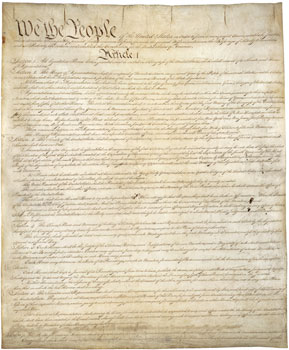Manuscript
Page: 1
US Constitution
Page: 1 | 2 | 3 | 4
| Date: | 1787 |
About this artifact
By 1786, Americans recognized that the national government under the Articles of Confederation needed to be modified substantially. The Articles gave Congress virtually no power to regulate domestic affairs--no power to tax and no power to regulate commerce. Without coercive power, Congress had to depend on financial contributions from the states, and they often turned down such requests. Congress had neither the money to pay soldiers for their service in the Revolutionary War or to repay foreign loans granted to support the war effort. A deep recession in the mid-1780s plagued the states struggling to remain solvent. Demands for paper money and other forms of debtor relief pitted state governments against their citizens. In Rhode Island, voters responded by electing representatives sympathetic to debtor relief. This "Country Party" authorized a paper money land bank based on real estate. It also passed legislation forcing all creditors to accept these bills as legal tender, even for debts contracted before the bank had been created. In contrast, the Massachusetts Legislature resisted paper money and other forms of debtor relief. Denied legislatively-sponsored relief, thousands of Massachusetts taxpayers turned to extra-legal measures such as court closings to pressure their government. The entry of these same people into the legislative arena following "Shays' Rebellion" was the last straw for men like James Madison. He and other worried leaders pinned their hopes on a full-scale redesign of the national government to curb the "excess of democracy" threatening the continued existence of the American republics. The result was the Federal Constitution, signed in 1787 and ratified in 1789. The United States Constitution has endured with only twenty-seven amendments for more than two hundred years.
| Print | Top of Page
